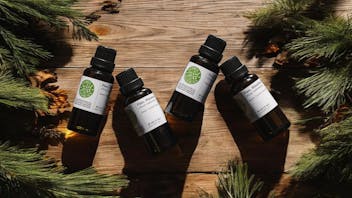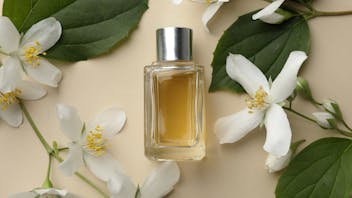Product Overview
The seductive aroma of our organic Ylang Ylang I is an intensely sweet and candy-like floral, with the balsamic aroma character of the oil being more apparent than in grades Extra and Complete. It is valued for its versatility in cosmetics and personal care preparations, and in natural perfumery where mere traces of Ylang Ylang I add finesse and sweetness to any composition.
Ylang Ylang’s heady, floral intensity is why it is unfairly referred to as “poor man’s Jasmine” – at a comparatively modest price it is one of the finest aromatic materials in the perfume industry. A deeply rich fragrance in itself, Ylang Ylang is a star ingredient in the natural perfumer’s palette, immortalized in many timeless fragrances, including Chanel No. 5 and Guerlain’s Samsara. The lively aroma elevates other florals it is blended with while imparting volume, texture, and a bit of mystery.
The name Ylang Ylang appears to come from the Filipino language, from the vernacular ‘Alang-ilang’ by which name this tropical, evergreen tree is known in most of the provinces of the Philippines, its native origin.[2] The trees are now cultivated almost exclusively in a tiny corner of the Indian Ocean – The Comoros Archipelago and Madagascar – where the steam-distilled oil from the large, drooping, highly aromatic flowers is a major export.
The ‘Extra’ fraction of Ylang Ylang essential oil, believed to have the finest odor for perfumery, is the first of four fractional distillates that are separated by distillation time and/or density (specific gravity). The subsequent ‘First’ and ‘Second’ medium density fractions contain increasing amounts of sesquiterpene hydrocarbons and are used in cosmetics and body care products. The ‘Third’ and lightest-density fraction is typically used to fragrance soaps, candles and incense. Ylang Ylang ‘Complete’ is technically the result of a continuous distillation of 18 hours or more, rendering a full spectrum, non-fractionated (complete) oil. Ylang Ylang Complete is the preferred oil for aromatherapy applications, however perfumers and high-end soap makers may also appreciate its complexity.
To richly experience Ylang Ylang with its voluptuous and sultry aroma, Tisserand suggests combining it with Clary Sage for a deeply relaxing bath. [3] Such is the euphoric power of Ylang Ylang’s sensual and comforting aroma, ideal in body and linen sprays, cosmetics, and hair, scalp, and skincare preparations, particularly for oily, congested or mature skin. The sweetly scented bouquet is a calming favorite, perfectly suited for adding into a diffuser or massage and bath oils before bed.
DILUTION NOTE: When this material is diluted in perfumer’s alcohol, there may be cloudiness (please see Solubility & Blending Suggestions section). Guenther explains: “The solubility of Ylang Ylang oil, in general, is poor. This statement applies to all qualities (fractions). Usually from 0.5 to 3 [percent by] volume of 95 percent alcohol [is] required to give a clear solution, which often becomes cloudy on addition of more alcohol.”[4] If cloudiness occurs, this precipitates upon standing and can be filtered out, leaving a perfectly clear dilution.
Need help deciding which Ylang Ylang is right for you? Please see this informative article in our Education section:
2 Guenther, Ernest. The Essential Oils, Vol. V, 1952/1985, p. 278.
3 Tisserand, Robert. Aromatherapy, 1988, pp. 196-9, 205.
4 Guenther, Ernest. The Essential Oils, Vol. V, 1952/1985, p. 300.



